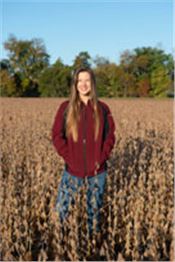|
SIU Doctoral Student Seeks Innovative, Sustainable Way To Control Aggressive Weed

Madison Decker, a Southern Illinois University Carbondale agricultural sciences doctoral student, is seeking an
unconventional way to combat common waterhemp.
Photo by Yenitza Melgoza
CARBONDALE, ILL.
Madison Decker, a doctoral student at Southern Illinois University Carbondale, is seeking an unconventional way to control a weed that causes significant yield losses in soybean production.
Over the 2019 and 2020 growing seasons, she has experimented with interseeding winter wheat in the spring, at the time of soybean planting, to provide ground cover and competition to combat the development of the aggressive common waterhemp. This is actually a new take on an old research idea, first developed by SIU weed scientist George Kapusta in the 1980s and recently adapted using new crop technologies by weed scientists Karla Gage and Ronald Krausz, in collaboration with Decker.
Decker in late September received a $15,000 grant from the North Central Region Sustainable Agriculture Research and Education Program (NCR-SARE) for her project, which complements research an SIU mentor has conducted for two years. This grant award will allow her to further her dissertation research on-farm with Southern Illinois and Southern Indiana growers.
“Growing one crop with another seemed really far-fetched when I was first approached with the system,” said Decker, who is earning her doctorate in agricultural sciences with an emphasis in crop science and environmental management. “It’s totally out of the norm. But this approach could benefit growers in need of alternative weed-control strategies to use in place of or to complement their herbicide program. The positive remarks and interest in the study have been awesome. Hopefully it helps to convince farmers in our region to look toward integrating other weed management tactics.”
Decker’s grant was awarded as part of NCR-SARE’s Graduate Student Grant Program, a competitive program to fund graduate student projects that address sustainable agriculture issues. The grant will cover Decker’s tuition, some materials and research-related travel for two semesters.
It will also allow her to continue implementing research on a subject that literally hits close to home. Decker hails from Southern Indiana (Washington) and a 2,000-acre farm (corn and soybeans).
“I wanted to study something that could be applied on our own farm one day,” Decker said. “I was motivated from my first weed science course at SIU – I learned how detrimental weeds could be.”
Decker, a 2017 SIU graduate, continued her education in Carbondale, citing vast opportunities for hands-on research and innovation in her field.
“It takes a special type of student to take that project and carry it,” said Karla Gage, Madison’s advisor and assistant professor of weed science and plant biology. “There’s skepticism anytime something new is introduced. Madison is very attentive to details and the perfect person to take this research further.” ∆
|
|